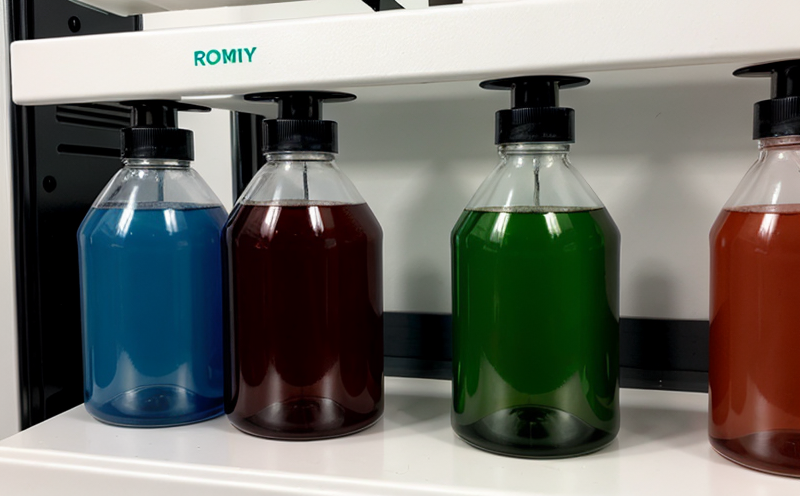AOAC 991 Polymerization Residue Reactivity Testing
The AOAC International Standard Method 991.40 (referred to as AOAC 991) is designed specifically for the determination of polymerization residue in food-contact substances and articles, including plastics and other materials used in packaging or food processing equipment. This test evaluates whether residual monomers, oligomers, or other by-products from the polymerization process pose a potential risk when contacted with food.
The primary goal of this testing is to ensure that any residues do not migrate into food products, thus maintaining product safety and consumer health. Compliance with AOAC 991 is crucial for manufacturers involved in the production of packaging materials, food-contact equipment, and other items likely to come into contact with edible substances.
The test procedure involves exposing a sample to an appropriate simulated food matrix under conditions that mimic real-world scenarios. The resulting residue is then analyzed using various analytical techniques such as gas chromatography-mass spectrometry (GC-MS), liquid chromatography-tandem mass spectrometry (LC-MS/MS), or other suitable methods depending on the compound being tested.
The AOAC 991 method ensures that all polymers undergo rigorous scrutiny to identify any residual monomers, oligomers, or other by-products. By adhering strictly to this standard, manufacturers can demonstrate their commitment to producing safe and compliant products for use in food-contact applications.
Adherence to AOAC 991 is mandatory for those involved in the production of packaging materials, food-contact equipment, and similar items. This ensures that all components used in direct contact with foods are thoroughly evaluated for potential risks associated with residual monomers or oligomers from polymerization processes.
The significance of this test cannot be understated given its role in safeguarding public health by preventing harmful substances from entering the food chain. Regulatory authorities worldwide recognize and enforce compliance with AOAC 991 as a key factor in ensuring product safety and regulatory adherence.
| Industry Applications |
|---|
|
The AOAC 991 Polymerization Residue Reactivity Testing is widely applicable across various sectors including:
|
This comprehensive approach guarantees that all materials used in food-contact scenarios are rigorously evaluated for their safety and compliance with regulatory requirements.
Why Choose This Test
- Comprehensive Evaluation: Ensures thorough assessment of polymerization residues to detect any potential risks.
- Regulatory Compliance: Helps manufacturers meet stringent regulatory standards for food-contact materials.
- Precision and Accuracy: Utilizes advanced analytical techniques like GC-MS and LC-MS/MS for precise residue identification.
- Confidence in Results: Provides reliable data on polymer residues, enhancing trust among consumers and stakeholders.
- Cost-Effective Solutions: Early detection of potential issues can prevent costly recalls or product rejections later in the process.
- Expertise and Experience: Leveraging experienced laboratories with specialized expertise ensures accurate results every time.
- Industry Recognition: AOAC 991 is widely accepted and recognized by regulatory bodies around the world, ensuring broad applicability and acceptance.
Quality and Reliability Assurance
The AOAC 991 Polymerization Residue Reactivity Testing service offers unparalleled quality assurance through stringent laboratory protocols and rigorous adherence to international standards. Our team of experts ensures that all samples are processed meticulously, using state-of-the-art instrumentation and techniques.
Our laboratories follow strict quality control measures to maintain consistency across every test conducted. This includes regular calibration of instruments, validation of methods, and continuous monitoring of data integrity. By doing so, we guarantee accurate and reliable results that meet or exceed industry expectations.
We employ highly skilled professionals who are trained in the latest methodologies and best practices for polymerization residue testing. Their expertise ensures that each sample undergoes thorough analysis, leading to precise identification of any residual monomers, oligomers, or other by-products from the polymerization process.
Our commitment to quality extends beyond just technical proficiency; it also involves maintaining a clean, controlled environment where all tests are conducted under optimal conditions. This dedication to excellence helps us deliver consistent and accurate results every time.
We understand that reliability is crucial when dealing with food-contact substances and articles. That's why our laboratories maintain strict adherence to ISO/IEC 17025 accreditation standards, ensuring compliance with international quality management systems requirements. This rigorous approach guarantees that all tests are conducted consistently and accurately, providing peace of mind for clients.
Our focus on continuous improvement ensures that we stay at the forefront of technological advancements in polymerization residue testing. By investing in cutting-edge equipment and ongoing training programs, our team remains well-equipped to handle even the most challenging samples.





